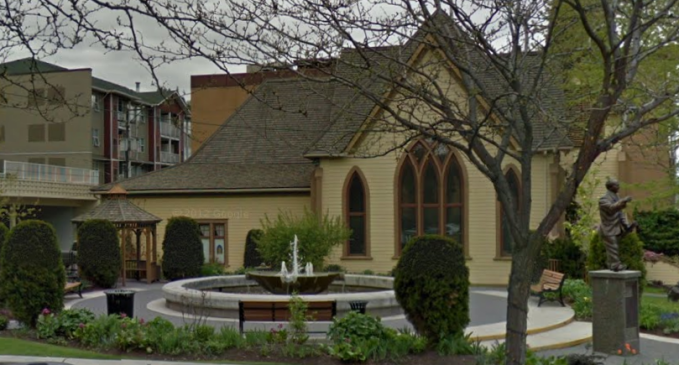Contact Us
- Phone: 250-828-8222
- Email:
- Mailing Address: 454 Columbia Street, Kamloops, BC V2C 2T5



Have you ever wondered what the economic impact is upon the city of Kamloops in saving a life? Have you ever stopped to consider the dollars and pennies that helping a person might generate for the economy of the city of Kamloops? Such things are difficult to empirically measure, which is probably why not too many have undertaken the task to try and assign a dollar value to something like salvaging a marriage, saving someone from suicide, or teaching a teenager the moral goodness of right from wrong.
Indeed, we Christians consider that averting suicide or helping a child to know right from wrong is something that is priceless, so we tend not to think too much about the actual economic impact that such things have upon the city of Kamloops or surrounding communities. I think to ignore this question, however, is a mistake.
Consider the question of economic benefit from the perspective of Kamloops City Council. I can't speak for the Mayor of Kamloops or any of the City Counselors, but I'm sure the question presents itself in their thinking this way:
Churches don't pay any form of taxes, neither property or sales tax. In fact, not only do churches not pay any form of tax, but they frequently ask for donations and monetary gifts from congregants and the residents of the city! Churches seem to take money out of the local economy, and it doesn't appear that their existence provides any tangible benefit to the city of Kamloops and surrounding communities.
If this is your thinking on the subject, you are probably less inclined to approve a rezoning application or to grant a variance on a building permit. After all, what's in it for the city to continue to grant exceptions and to allow property to be rezoned for non-taxable purposes?
That's why Christians need to start answering the question: what is it worth to Kamloops, or Logan Lake, Ashcroft, Cache Creek, or Chase, to establish a church in these communities? If it were possible to measure the tangible economic benefit of establishing new churches in these communities, what would that economic benefit add up to in dollars and sense? City leaders typically think in terms of dollars and sense, so is it really that hard to translate the economic value of Christian ministry into a language that the City Council of Kamloops could understand?
Back in 2010 a University of Pennsylvania professor and a national secular research group based in Center City Philadelphia began to address the question of the actual economic benefit to the surrounding community, the "halo" effect, that stems from Christian ministry conducted through local churches. They attempted to calculate the economic "halo effect" measured in dollars of a dozen religious congregations in Philadelphia consisting of ten protestant churches, one Catholic parish, and one Jewish synagogue.
The economic thinking was simple: if a man commits suicide or divorces, his wife must be the sole bread winner for the family and most likely will need to draw on government services and subsidies in order to provide for the family. Things like daycare and public transit become more essential to the family's survival. Depending on the nature of the man's absence from the family, his children, particularly boys, will need additional counseling and the aid of government services and subsidies in order to become productive and contributing members of society. Without these government subsidized counseling services, the children may fall into a criminal lifestyle, and this outcome would produce an economic strain on the community in the form of theft and property crime.
Additionally, the diminished income resulting from the father's absence means that as the children graduate high school and decide to pursue university or trades, they must incur significant debt to finance their education. Increased debt results in less local purchasing power. All of this drawing upon government services and taking out loans in order to overcome the disaster of the father's departure from the family adds up to real tangible dollars taken away from the community that can be empirically measured. Churches, with a helping hand and the offer of a loving God to meet deep spiritual needs, provide assistance that can avert divorce, prevent suicide, and ultimately reduce the total economic strain that such events place upon the community.
But the study went further than this. The research group added up the money generated by weddings, funerals, festivals, counseling programs, preschools, and care for the elderly and senior citizens. They tallied the salaries of staff and the wages of roofers, plumbers, electricians, musical instrument and supply stores, even snow-shovelers. They attempted to put dollar signs on intangibles too, such as helping people find work and teaching children to be socially responsible. As crazy as it sounds, they even measured the diameter of the trees on the various church properties in order to calculate the relative economic benefit of horticulture care and landscaping costs associated with larger trees.
Do you know how much economic benefit twelve congregations can produce within a city? The answer... $50,577,098.00! Let me spell that out: over fifty million dollars! Twelve churches within the inner city of Philadelphia combined to provide a local positive benefit worth more than fifty million dollars.
The three hundred member Episcopalian Church contributed as much as $1.65 million dollars in tangible community services and economic benefits while the seven thousand member Catholic Parish was good for $22.4 million in positive impact on the city. When these numbers are broken down and statistically analyzed, the overall average of a single Christian worshiping and participating with a local church is worth around $4,350 in tangible services or actual economic benefits to the local community! What this means is that for every single Christian that participates and gives to a local church in the city of Kamloops, the annual benefit to the local community, including Kamloops and surrounding communities, is worth over four thousand dollars per Christian! The entire report can be read here.
It sounds astounding, doesn't it? But the answer remains. When measured in terms of dollars and sense, churches provide greater economic benefit and health to the community per capita than any other business or industry. But I leave off with a question that Jesus posed thousands of years ago; it is a question for city counselors who tend to think only in terms of dollars and sense:
"What does it profit a man to gain the whole world and forfeit his soul? For what can a man give in return for his soul?" Mark 8:36-37
As positive a financial contribution that churches make to their local communities, there is a more profound reality that every citizen must keep in view. Churches help remind local residents in Kamloops that there are bigger things in life than dollars and pennies, and it is the churches that remind us all of this basic truth. We are all more than the sum of our possessions. We are all worth more than the taxes we pay.
What's it worth to rescue a marriage in trouble? What's it worth to offer a shoulder for a troubled teenager to cry on? What's it worth to save a life?
If we lose our churches... if we lose the Christ that our churches proclaim... then we lose our soul.
God bless!
Comments
Login/Register to leave a comment